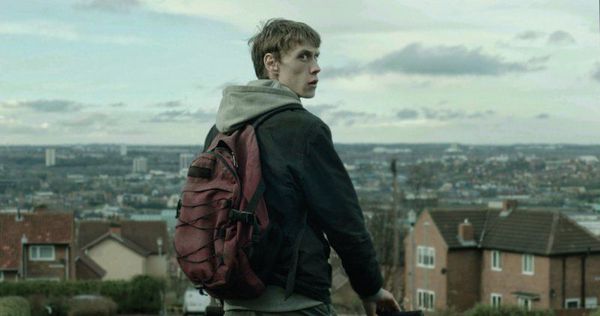Eye For Film >> Movies >> Bypass (2014) Film Review
Bypass
Reviewed by: Jeff Robson

In the words of the song, it’s hard to be a saint in the city. As Duane Hopkins’ gruelling but moving second feature makes clear, it’s no picnic just trying to lead a normal life, either. The mood is established early on, as an unnamed character, his back turned to us, walks purposefully through a grim, starkly-lit urban landscape, remembering the low points of a traumatic life.
He’s Greg (Benjamin Dilloway), a once-promising footballer from a long line of factory workers. But injury and economic circumstance have turned him into a petty criminal, burgling houses and fencing the haul round the estate in collusion with his old mate Lester (Matt Cross). But when a job goes wrong and the police come calling - in a pulse-quickening set piece that wouldn’t look out of place in a glossy thriller - Greg is put away and the focus shifts to his younger brother Tim (George Mackay).
Instantly transformed from a gawky schoolboy into the family’s main breadwinner, Tim has to cope with the legacy of an absent father, a terminally-ill mother and a stroppy kid sister (Lara Peake) disinclined to be told what to do by anyone. Besieged by bailiffs, social workers and Greg’s criminal cronies, the only way he can make ends meet is by taking up what’s becoming the family business – thieving.
It soon becomes clear he’s full fathoms five out of his depth; a part-timer surrounded by people who (as one villain considerably higher in the food chain tells him during a harrowing deal-gone-very-wrong) “do this for a ****ing living”. On top of which, he has a mystery illness which periodically has him experiencing blackouts and vomiting into the nearest toilet bowl.
It’s an over-familiar milieu and at times Hopkins does lay on the suffering and urban alienation with a trowel. But he has an eye for a telling image and coaxes powerful, committed performances from his cast. Mackay, in particular, is excellent, building on the promise of For Those in Peril; the strung-out eternal victim, desperately trying to achieve nothing more than his world slowing down a bit, as it unravels before his (and our eyes).
His illness is clearly a metaphor for the sickness that has descended on communities deprived of a heart by the erosion of traditional industries. And the title also seems to symbolise a vital missing part that Tim and Greg’s lives have bypassed; the father figure, providing financial certainty and moral guidance. It’s clear from the flashbacks and the brothers’ reminiscences that their dad was a good man. But his inability to cope with adversity and stay with his family has set a potentially tragic chain of events in motion. When Tim’s girlfriend Lily (Charlotte Spencer) tells him she’s pregnant, it looks like a chance for him to take on that mantle and achieve some sense of stability and self-respect. But he sees it as just another responsibility to add to a crippling load and his initial reaction is denial and flight.
On top of which, he’s become sucked even deeper into the real villains’ world. Only by calling on the help of Greg, newly-released and stuck in a dead-end job, for a one-off house raid that could clear his debts, can he hope to get out. But, as always, things aren’t quite that simple…
It all builds to a pulse-racing climax, with Tim’s fate in the balance right until the end. And here Hopkins proves himself as adept at working a good story to its conclusion as at creating a mood. He’s helped by David Procter’s atmospheric camera work and a raft of classy supporting performances.
Dilloway is a compelling screen presence as the idolised older brother, who might just be a bit too comfortable with the criminal life. Spencer is in many ways the heart of the film, a beacon of decency and unselfish love who refuses to be defined by her surroundings. And there’s a poignant turn from veteran Donald Sumpter as the boys’ grandfather, worn down by a hard life and powerless to stop his family disintegrating.
It’s nothing that’s not been seen before, and is often a bit too disjointed and meandering. But at its best, Bypass turns an unblinking eye on a world where economic upturns or government initiatives seem very remote and suggests that, even in such a world, acts of decency and mutual respect can yield a hard-won victory.
Reviewed on: 06 Oct 2014















